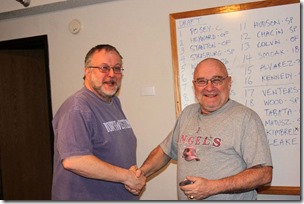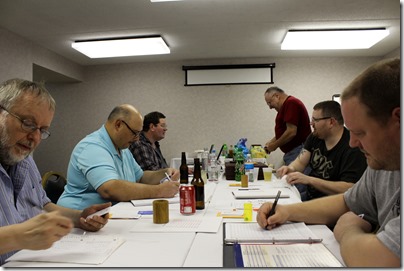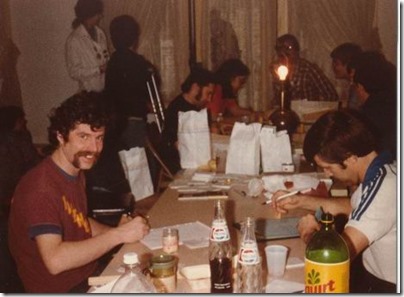The IAL begins its 2013 season
On my post about the IAL draft weekend a few days ago, Scott Fennessy (who writes the fantastic write-ups on his 1905 replay on this blog) left a comment asking “Just wanted to know how a league like this works as I have only played solo”.
That’s a big question but probably deserves an answer. I’ll be honest. When I started this blog a few years ago, I came from a very league-centric perspective. Oh, I’ve done (or at least started) my share of replays, most recently in conjunction with my friend Brando, but a lot of my APBA time and energy is spent on the Illowa APBA League.
I realized I started this blog a few years ago with two incorrect assumptions:
1) Everyone plays in leagues- Okay, I didn’t really think that but I had the idea that most APBA players had a good idea what they are all about. While I think most have a faint idea of what happens in an APBA league, there certainly are some concepts regarding leagues that might be good to explain.
2) All APBA leagues are run exactly like ours- I suppose that’s human nature to believe that if you’re doing something one way that works for you, you would assume everyone else would do it the same way. That’s simply not true. There are different methods of playing, modifications of the game, drafting and roster changes, schedule differences… you name it. It’s amazing how diverse the leagues are.
So what is an APBA League, already?
Now, to get this right, I don’t want to blow point #2. I’ll be as general as possible in my definition of an APBA league.
Generally speaking, an APBA league is a group of APBA players who play an APBA tabletop game in an organized fashion with a competitive aspect. Games are usually scheduled in advanced and statistics are kept.
The biggest factor in APBA leagues is each league member taking on the identity of their team. They become the general manger, field manager, PR person, journalist, you name it. They influence the outcome (hopefully, for the better) by making trades, drafting players and of course, managing the game in a competitive fashion.
How do APBA Leagues differ?
There are many different types of leagues out there. Each time I hear from one, I am reminded of that. Here are some of the different ways they play:
The sport they play: There are APBA leagues for pretty much every sport that the Company puts out. Most prevalent are baseball and football leagues but I know there are leagues for hockey and soccer, maybe even golf.
The game version they play: There are Basic Game leagues, Master Game leagues as well as Baseball for Windows leagues. The Basic and Master Games are also subject to various forms of modifications ranging from minor ones to revamping the pitching system (a post for another day).
How the games are played: Some leagues are played Face-to-face (F-T-F) while others are “mail” leagues with basic instructions sent to the opposing manager to be played. Still others use the latest technology of the Internet and play via Skype. A lot of leagues use a mix of what works.
What seasons are played: A lot of leagues use the current (i.e 2012) MLB season. That said, retro leagues are becoming quite popular now. Retro leagues are those that use sets from seasons from past years.
What players are used: Many leagues are draft leagues which initially draft players using some sort of draft to choose their players. These leagues may be “continuous ownership” or “keeper” leagues in which the teams keep the same players from one year to the next. Others may just use stock teams using the players on their actual MLB team. I’ve even heard of retro league keeper leagues which start out as stock teams but through trades, rookie drafts the teams become unrecognizable and take on an identity of their own.
How long their seasons are: Some leagues play a full 162 game (or 154-game depending it’s a past retro league) season schedule. Others because of time constraints or scheduling issues, agree to a shorter schedule such as a 100 games or 62 games.
But what about Tournaments?
Tournaments are a great way to get a feel for competitive play. They’re also a good way to meet other APBA players that you wouldn’t normally play. APBA tournaments such as the one held at the annual APBA convention can be set up in a multitude of ways. Normally though, it’s a one-time event as compared to a league which hopefully is set up with a long lasting goal in mind.
The Illowa APBA League circa 1983 (that’s me in the back with the orange shirt)
A few questions answered
In my conversation with Scott, he asked me some good questions. I’ll say right now that I’m answering from the Illowa APBA League’s perspective since every league is different. Hopefully, we’ll get some comments from others who are leagues, too
“How often does your league get together?”
It depends on the league’s schedule and geography. Some leagues have members who live pretty close together. Others are spread out across the country. The IAL gets together as a whole three times a year. Once for our draft/postseason, once for the All-Star Game, and one more time during the late spring where all we do is play APBA.
“I was wondering how long your gaming sessions are?”
Again, this varies depending on the league, how their schedule is set up and how often they get together.
The IAL plays 6 games series during our inter-league weekends. For our intra-division series that are played in between, they are 9 games apiece. The logic being that with a limited time in one weekend and five teams to play, 30 games is about our limit. Also, some of us travel a bit for our intra-division series so it’s nice to get 9 games in for our effort.
“Do you do these via email as well, or say even phone a game in (not like Piniella did that last season)?”
LOL… Yes, many do use Skype or even put the the other manager on speaker while playing. In my opinion, it’s not as fun as face-to-face but more fun than doing them by mail. The interaction is so key for me. Also, computer leagues have used screen sharing software so that both managers can see and play BBW at the same time.
“How do you work with rookie managers regarding say games allowed limits and other "break in" type stuff?”
That’s a good question. Our new manager, John Heneghan could probably answer how well we did with that. There are a lot of rules and regulations to keep in mind. It helps to have them spelled out in a league constitution (here’s a link to the IAL’s) in case there are any questions. That said, the veteran managers are pretty helpful with the new guy explaining the many nuances that wouldn’t necessarily be obvious to a new person coming on board. That and we don’t try to rip him off in a trade either. :)
Is an APBA league for everybody? Probably not. There are some good reasons to join (or form) a league but it may not be everyone’s cup of tea.
Why would you join an APBA League?
Because of the people! Quite honestly, this is one the biggest reasons for me. I’ve been in the IAL since 1980 and I have formed friendships and bonds with the members of the league. We may have come together to play APBA but sometimes we get to jibber-jabbering that playing the games comes in second place.
Because of the competitive aspect: It’s one thing to play APBA solo or as part of a replay project. It’s something totally different when the objective is to take a team and try to make it better and win with it while your opponents are trying to do the exact same thing. That changes the goal of playing the game in a lot of ways.
Every league is different. The IAL is pretty laid back. As I said, the social aspect is important to us but that doesn’t mean we don’t want to win either. In my opinion, a fun, competitive atmosphere is conducive to a good time as long as every member is on the same page and understands the dynamics.
Learning the game of APBA (and baseball): There’s a lot to be said for the sharing of knowledge that happens between ten guys. I’ve learned a lot about the game of APBA and the sport of baseball (the stories I’ve heard from the ‘old’ guys).
Why would you NOT want to join a league?
 Because of the people! Okay, I sort of threw that in there as a joke but it’s true. If you are kind of person who likes to do things your way and needs to have control of your project, a league is not the best option. Much of operating in a league is compromise and working towards a mutually acceptable solution.
Because of the people! Okay, I sort of threw that in there as a joke but it’s true. If you are kind of person who likes to do things your way and needs to have control of your project, a league is not the best option. Much of operating in a league is compromise and working towards a mutually acceptable solution.
And yes, sometimes you may have to deal with people and situations that are not to your liking in leagues. Fortunately, that hasn’t been a big issue with the leagues I’ve been in but I’ve heard stories. My advice: if you’re looking for a league, try to find a long-standing league with members that are committed to integrity.
Adherence to logistics and regulations: Some leagues require travel. Almost all leagues require that games get played on a schedule. Put simply, you need to follow the rules and conventions of the the league so that the league can run smoothly. Unlike a replay where you have total control and call the shots, you must adhere to some (possibly strict) regulations or rules.
Cost: Similar to above, if occasional travel is necessary, you may need to pull out your wallet more than you would like.
Summary
Personally, I like the back and forth that goes on during league play. It’s not so much the competitive aspect though that appeals to me as well. To me, it’s the organized banter, the re-creation of a new league rather than a replay of an existing one. Don’t get me wrong, I certainly see the appeal of both.
I guess the biggest reason I like league play is that it takes Dick Seitz’ old PR statement “YOU BE the Manager” to the hilt. As I said, when I become manager of the Twin City Thunderchickens, I take on many roles, from GM, manager, PR person, scout (even concession manager when I provide snacks :)). With a league team, I am ultimately responsible for this team when it fails and I have bragging rights when it succeeds.
I realize I have only just started to scratch the surface for covering what it’s like to be in a league. A lot of this is probably old hat to those of you already in leagues. Or maybe you’re thinking, “No, that’s not how we do it!” (see Point #2 above). Feel free to share your thoughts and/or experiences as though you were explaining it to someone who has never been in a league before.






Tom, that was a great (and welcome) post. I’ve only done solo, currently replaying 2011 season, and been curious about league play. Thanks for the informative Q&A.
That said, anyone know of a baseball league in the Philadelphia area??
Tom Dunn
Hey Tom,
Maybe hook up with Brian Cavanaugh. He frequents this blog now and then. He lives in Philly.
He might be a bit busy now. He just had a baby. Congrats by the way, Brian!!
I have toyed with the idea of joining a league, but due to current travel restrictions will have to pass on for now, but it does still allow for me to continue my replays and that is enough of a challenge for me currently.
Thank you again Tom.
Hi Tom,
Forgot one other question. I know when I play solo I sometimes pause to consider hit and run/sacrafice situations.
Is this something that would be cause for issue when playing head to head?
Scott, that’s a good question. Generally, no.
That said, it’s good when you have five series going at one time and you’re running on a schedule, you want to keep things rolling (no pun intended).
H&R and sac decisions aren’t so much an issue but sometimes you have “card-counters” that is, managers who ask for the batter’s card and count the hits to see if there might be a better reliever in the pen that might stop a few. Doing that a lot, might slow the game down.
There are others who simply call time out to quell the momentum of a rally (if you’re reading this, you know who you are). That doesn’t bother me as long as isn’t done too often. It’s legal and it’s a good strategy pure and simple.
Generally, though it’s pretty laid back (at least in our league). We’re there to have fun not rush, rush, rush.